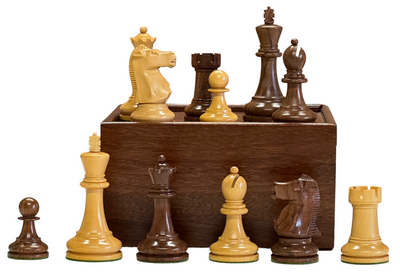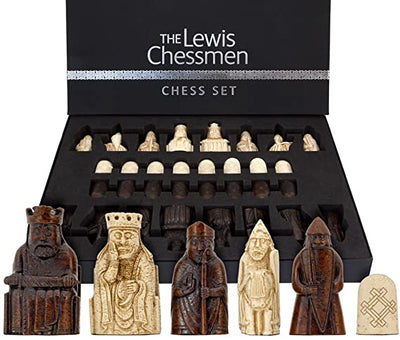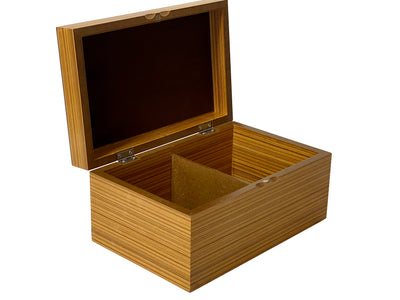5 Tips on How to Become a Good Chess Player
If you’re someone who owns a chess set and you really like the sound of playing on a regular basis, but you’ve only just started out, there’s a good chance that you haven’t really got to grips with the ins and outs of the game yet. A high-quality chess board sitting underneath an exquisitely crafted set of chess pieces can be extremely enticing, even to a novice, so wouldn't it be nice to improve your game and really start to enjoy the game in its fullest form?
5 Tips to Get Better at Chess
This article aims to help novice chess players get a headstart to learn how to get good at chess. As with anything, practice is all it takes, but the lessons you earn from those will be your most valued possessions as you improve your game quality. Here are five simple tips you can follow on how to become a good chess player:
1. Play, Play, and Play Again
When you’re trying to improve your playing skill and understanding of the game, there is simply no substitute for getting your chessboard out and playing. Playing against yourself, or against friends and family is a great way to start, but we’d recommend, if you can, playing against somebody with a degree of skill.
You’re only going to learn how to become a good chess player, by playing against someone better than you. Playing against someone who’s also new to the game is fun, but it’s not going to teach you much about strategies needed to leave you with the most chess pieces left at the end of the game.
Another great chess learning tool is to review each game after you’ve finished, to find out where you went wrong. If you can recognise where it was that you allowed the advantage to go to your opponent, there is much less of a chance that you’ll repeat it next time or any time after that.
2. Don’t Try and Learn Everything at Once!
The game of chess has been played for centuries, which means that there are A LOT of things to learn about the game. Whilst the chess pieces stand in the same place on the chessboard at the beginning of every game, there are hundreds of different strategies and tricks to learn to become a good chess player. When you start learning about the game’s tactics and strategies, try and limit yourself to what we’d class as the important stuff.
Learning some basic moves, to begin with, along with a few openings and endgames will stand you in good stead while you’re finding your feet. As your knowledge increases, you’ll learn other things like, how to spot when the chess pieces are positioned on the chessboard in such a way that a draw is a likely outcome.
We’re not saying you shouldn’t learn the complicated stuff at some point, but rather that you should walk before you can walk. Knowing when to walk away and conserve your energy for future games is an especially important skill that you’ll use if you ever play tournament chess.
3. Be Open to Constructive Criticism
If you’re lucky enough to have a chess coach, you’ll likely be receiving lots of praise and criticism about your game. When you’re getting constructive criticism about how you played your chess pieces against your opponent, it’s important to remain open and take what’s being said on board.
A coach will typically watch from the side of a chessboard as you move your chess pieces around and will have a great overall view about how you’re playing, so they can clearly see both the good and bad moves that you make. If you chose your chess partner well, they’ll likely have a lot of knowledge to impart to you as they play, so listen to what they have to say.
No one is brilliant at the game right at the beginning of the journey, so bear that in mind if you’re finding the game a bit frustrating. Being able to learn what you’re doing wrong is one of the best tips to get better at chess.
4. Use and Maximise All Your Chess Pieces
At the outset, it can be easy to focus on the most useful and mobile of the chess pieces you have sitting in front of you. As great military generals will tell you, no one can win a war with only soldiers or just cavalry and the same applies in chess. To become a good chess player, you need to learn to use all of the pieces on the chessboard as part of an overall plan of attack.
As you progress in the game, you’ll learn to develop your chess pieces into better positions on the chessboard, so that they can all be used together in a harmonious attack. Teamwork is the key to developing a more sophisticated game and the more chess pieces you employ in your assault on your opponent’s Queen, the more robust your attack will be.
5. Start Memorising Games
Chess is a very cerebral game and one that calls for a good degree of memory. The more you use your memory, the better it will get, so we’d recommend trying to memorise not only your own games but famous games from throughout the annals of chess history.
Doing so on a regular basis will help not just your memory, but also your visualisation skills and allow you to precisely recall where the chess pieces are moved throughout the game. There have been a lot of high-profile games over the years, and there is a wealth of information and videos available online to help you on your journey.
We would recommend pick from games played by top players or world champions from the archives and watch closely as they ply their trade. A good game to play while watching is to guess where these chess masters are going to move their chess pieces next. The more frequently you guess right, the better you’re getting!

How to Become a Good Chess Player
Of course, there is a lot more to becoming a good chess player than what we’ve talked about here, but if you try and employ just some of those shown, you should soon find that your understanding and ability to play the game will improve. Even those at the very top are continuously learning about the game, so you’re not on your own in your efforts.
We thank you for reading our blog, and we hope that it has, even in some small way, given you what you need to start enjoying the game of Kings on a whole new level.







